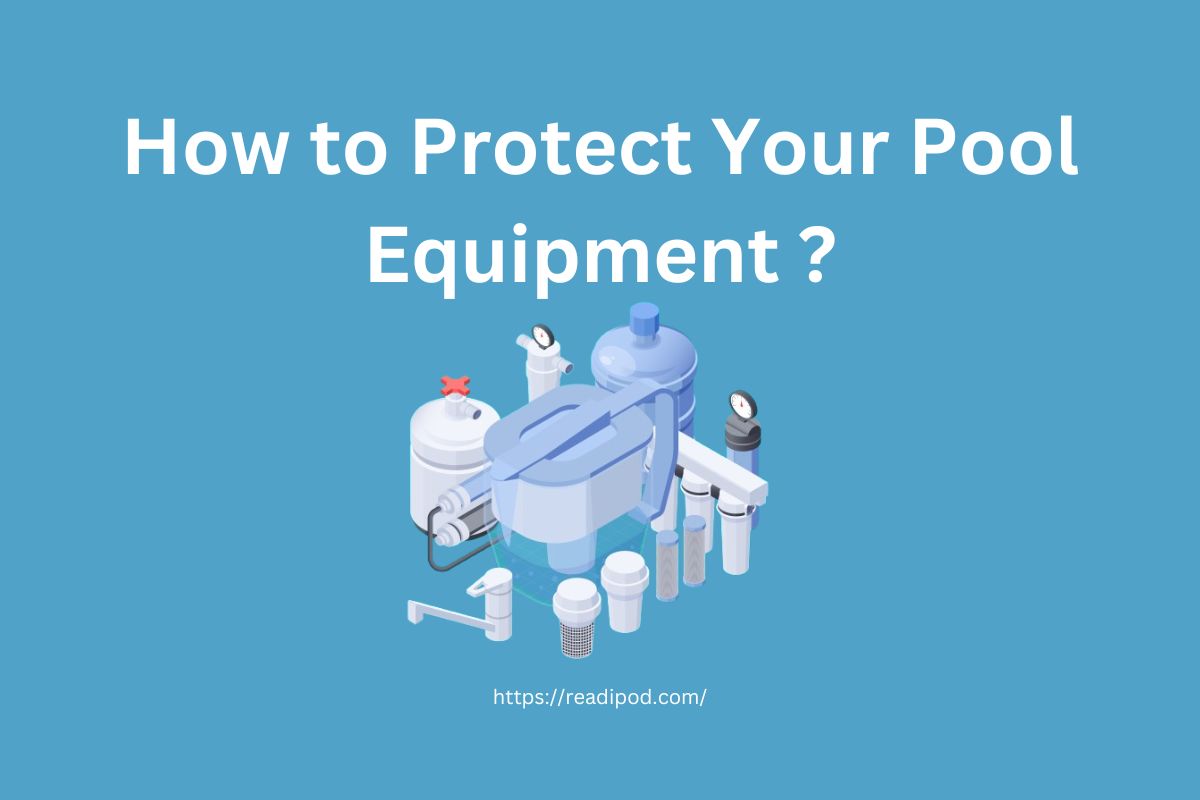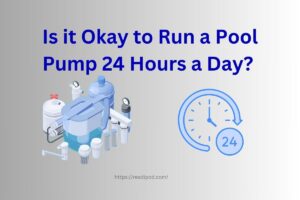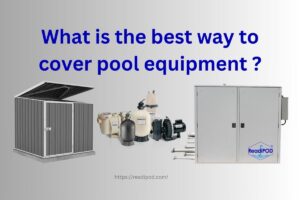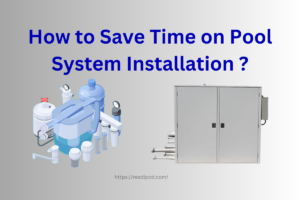Having a pool in Florida is a great way to enjoy the sunshine and spend time with family and friends. But Florida’s weather can be tough on pool equipment. The strong sunlight can make plastic parts brittle and cause them to crack. Storms and hurricanes can bring high winds, flying debris, and heavy rain that can damage or even ruin your pool system. On top of that, flooding is a common issue, and it can cause rust, electrical problems, or other costly repairs.
Taking steps to protect your pool equipment is important to keep it working properly and lasting a long time. Simple things like covering your equipment to block sunlight, securing it before storms, and raising it off the ground to avoid flooding can make a big difference. In this guide, we’ll share easy and effective ways to protect your pool system so you can enjoy a clean, well-maintained pool all year long.
How ReadiPOD Helps to Protect Your Pool Equipment
ReadiPOD is a smart solution for keeping your pool equipment safe from Florida’s tough weather. Its strong, weather-resistant design protects your equipment from damage caused by intense sun, heavy storms, and high humidity. The system’s rust-proof construction keeps pumps, filters, and electrical parts secure and shields them from wear and tear.
What makes ReadiPOD even better is that it comes pre-assembled, plumbed, wired, and tested, making installation quick and easy. This reduces the chances of leaks or malfunctions. Plus, it’s customizable to fit the needs of your pool, whether it’s outdoors or indoors.
By choosing ReadiPOD, you get a reliable, all-in-one system that protects your equipment, saves money on repairs, and keeps everything running smoothly. It’s a hassle-free way to enjoy your pool without worrying about equipment problems.
Understanding the Risks to Pool Equipment
Pool equipment is essential for keeping your pool clean, safe, and enjoyable, but it faces several risks, especially in Florida’s challenging climate. Understanding these risks is the first step to protecting your system and avoiding expensive repairs.
1. UV Damage
Florida’s intense sunlight isn’t just tough on your skin—it’s also tough on your pool equipment. Prolonged exposure to ultraviolet (UV) rays can weaken and degrade plastic components, such as pump housings, filter lids, and valves. Over time, this can lead to cracks, leaks, and reduced performance.
2. Storm and Wind Damage
Hurricanes and tropical storms bring strong winds, heavy rain, and flying debris, all of which can wreak havoc on pool equipment. Items like pumps, filters, and heaters can be knocked over or damaged by falling branches or other debris. Electrical systems are also at risk of short-circuiting if exposed to excessive water.
3. Flooding and Water Damage
Flooding is a common problem in Florida, especially in areas prone to heavy rain or storm surges. When pool equipment is submerged, it can suffer from water damage, corrosion, and even saltwater intrusion. Electrical components like motors and control panels are particularly vulnerable, as standing water can cause them to fail or pose safety hazards.
Best Practices for Protecting Pool Equipment
To ensure your pool equipment stays in good condition despite Florida’s challenging weather conditions, it’s essential to take proactive measures. These best practices will help protect your system from UV damage, storms, flooding, and other risks, extending the lifespan and efficiency of your equipment.
1. Shielding from UV Damage
To protect your pool equipment from the harsh Florida sun, consider installing UV-resistant covers or enclosures. These will block the sun’s rays from directly hitting sensitive components like pumps, filters, and valves. If possible, place your equipment in naturally shaded areas or install a pergola or canopy to reduce sun exposure. Regular cleaning also helps keep debris off the equipment, preventing heat buildup that could accelerate UV damage.
2. Preparing for Storms
Before a storm hits, disconnect the power supply to your pool equipment to protect it from power surges. Ensure all components are securely fastened to the ground using tie-downs or anchors to prevent them from being displaced or damaged by high winds. Use heavy-duty waterproof covers to shield your equipment from rain, falling debris, and flying objects. Trimming nearby trees and clearing the area around your equipment also helps minimize storm-related risks.
3. Flood Mitigation
In flood-prone areas, elevating your pool equipment is a crucial step in preventing water damage. Use a raised platform or stand to keep your equipment above potential flood levels. Ensure the surrounding area has proper drainage to prevent water from accumulating near your equipment. Sealing electrical connections, pipes, and other vulnerable parts with waterproof materials can also reduce the risk of water damage.
4. Regular Maintenance and Inspections
Regular maintenance is vital to keeping your pool equipment in top condition. Inspect components for cracks, wear, or discoloration caused by UV exposure. Check filters, pumps, and electrical systems for any signs of damage after storms or flooding. Cleaning debris from filters and checking for clogs can prevent equipment strain and increase efficiency.
5. Invest in Durable, Weather-Resistant Equipment
Consider investing in high-quality, weather-resistant pool equipment designed for Florida’s tough climate. Corrosion-resistant metals, UV-protected plastics, and waterproof electrical components can help minimize damage from sun, rain, and saltwater. While these may cost more initially, the long-term savings in maintenance and repairs are well worth the investment.
Seasonal Maintenance Tips for Protecting Pool Equipment
Proper seasonal maintenance is key to ensuring that your pool equipment remains in excellent condition throughout the year, especially in Florida where the weather can change quickly. By performing regular checks and taking preventative measures during each season, you can reduce the risk of damage caused by harsh conditions, prolong the lifespan of your pool system, and avoid costly repairs.
1. Spring Maintenance
As temperatures rise, it’s essential to prepare your pool equipment for the upcoming swim season. Begin by thoroughly inspecting all components, including pumps, filters, and heaters, for any signs of wear or damage from winter storms. Clean or replace filters, check for cracks in the housing, and lubricate any moving parts. Ensure that the equipment is securely anchored, especially after any strong winds or rain. Test the pool’s electrical system to ensure everything is working properly, and check for any leaks in the plumbing. Clear any debris that may have accumulated around your equipment to improve airflow and efficiency.
2. Summer Maintenance
During Florida’s hot and humid summer months, your pool equipment is likely running constantly. It’s important to check your system regularly for signs of overheating or excessive wear. Clean the pool filter and ensure it is working at peak performance. Inspect the pump for any unusual noises or signs of wear, and verify that the pool’s circulation system is functioning properly. Regularly check the pressure gauge to ensure the system isn’t under strain. Summer storms and heavy rains are common, so take extra precautions by securing equipment before hurricanes or tropical storms hit and protecting vulnerable electrical connections from water damage.
3. Fall Maintenance
As hurricane season comes to a close and the weather cools, it’s time to prepare your pool equipment for the upcoming winter months. Fall is the perfect time to inspect and clean any outdoor pool equipment enclosures, making sure they are free of leaves and debris that could block ventilation. Clear the pool area of any fallen branches that could damage equipment during a storm. Check all seals, gaskets, and electrical connections for leaks or signs of wear. If necessary, disconnect power to your equipment during periods of inactivity or for added storm protection. Also, inspect your drainage system to ensure water flows freely away from the equipment.
4. Winter Maintenance
In Florida, winter usually means a break from pool usage, but it still requires attention. Ensure your pool equipment is properly winterized, especially if temperatures are expected to drop near freezing. While freezing isn’t as common in Florida, certain equipment may need to be drained and covered to prevent water from freezing and damaging pipes or pumps. Clean and store any removable parts such as pool heaters or chlorinators to prevent weather damage. Winter is also a good time to assess any long-term repairs or upgrades you may need before the next busy pool season.
5. Year-Round Care
Regardless of the season, it’s important to perform ongoing checks on your pool equipment. Regularly inspect for signs of UV damage, corrosion, or storm-related issues. Keep equipment clean and free from debris to prevent blockages that can cause overheating or malfunctions. Consistent monitoring of your pool’s electrical systems, plumbing, and filtration systems helps detect any issues early, ensuring that small problems don’t become bigger ones down the road.
Invest in Durable, Weather-Resistant Equipment
Protecting your pool equipment from Florida’s tough weather is essential to keep it running smoothly. Intense sun, storms, and humidity can cause wear and tear on regular equipment. That’s why investing in durable, weather-resistant equipment is a smart choice.
ReadiPOD is a great example of equipment built to last. It’s designed to withstand the harsh Florida climate, with features that resist UV damage, rust, and wear from storms and humidity. ReadiPOD’s compact and sturdy system includes everything needed for your pool, such as pumps, filters, and wiring, all housed in a secure unit. Choosing ReadiPOD helps you avoid frequent repairs and reduces maintenance costs, so you can enjoy your pool without worrying about equipment problems.
Investing in weather-resistant equipment like ReadiPOD means protecting your pool system and ensuring it lasts for many years.
Why Professional Maintenance Matters
Professional maintenance is important to keep your pool equipment working well and lasting longer. While you can do basic cleaning, a professional technician has the experience and tools to spot problems that you might miss, like leaks or early wear.
They can fix small issues before they turn into expensive repairs. Professionals also help make sure your pool equipment runs efficiently, saving you money on energy bills and preventing breakdowns. Regular maintenance by a pro keeps your equipment in good shape, so you don’t have to worry about unexpected problems. It also helps protect any warranties you might have.
Choosing professional maintenance gives you peace of mind, knowing experts are taking care of your pool equipment.
Conclusion
Protecting your pool equipment from Florida’s tough climate is essential to ensuring its long-term functionality and durability. With intense UV rays, frequent storms, and the risk of flooding, your pool system is constantly exposed to conditions that can cause wear and tear. By understanding these risks, like UV damage, water-related issues, and storm damage, you can take steps to safeguard your investment. Choosing durable, weather-resistant equipment like ReadiPOD is an excellent way to minimize damage from harsh weather conditions. ReadiPOD’s rust-proof and UV-resistant features make it ideal for withstanding Florida’s unpredictable climate while keeping your system running efficiently.
In addition to selecting high-quality equipment, regular maintenance and professional servicing are key to protecting your pool system. Seasonal checks, proper cleaning, and securing equipment before storms will help you catch small issues before they become costly problems. By taking these proactive steps, you not only save money on repairs but also ensure your pool operates smoothly year-round. Investing in weather-resistant equipment and maintaining it properly will give you peace of mind, allowing you to enjoy a well-functioning pool without worry.





